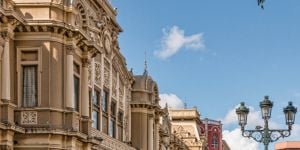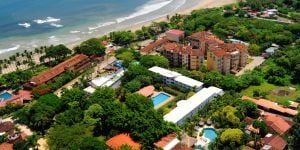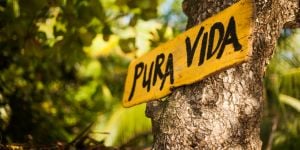Caja plan
Last activity 25 January 2014 by cupacoffee
11207 Views
50 replies
Subscribe to the topic
Post new topic
Hi, my name is Jerry and Iam super impresed on how you guys stick to a budget. We will be retiring there and I hope we are able to manage as well as you do. I have a question about Health Insurance, we are both in our mid 60s and will be applying for our Residency on arrival, but can we buy into the Caja plan until we become Residence? If so how much would it cost approximately.Thanks
Thanks,I guess that we will pick up a Private Policy temporally.
Hi Jerry,
I have created a new topic as from your post on the Costa Rica forum.
All the best,
Christine
can we buy into the Caja plan until we become Residence?
Officially not, but it is possible. To be in the CAJA is a requirement when applying for residency, so in reality you can join the CAJA without having residency.
My understanding is that once you get approved for the residency by the immigration department , then you have to join the CAJA . this is the last step to get the "cedula" .
So you cannot joint outside this final process of the residency procedure.
My understanding is that once you get approved for the residency by the immigration department , then you have to join the CAJA . this is the last step to get the "cedula" .
You have to join the CAJA befor you can apply for residency!
So you cannot joint outside this final process of the residency procedure.
It is mandatory to join before you apply!
Hello OldMark,
From where did you get this assumption , because I do not agree ?
I was just in the ARCR office and asked this question. I was told I would not be eligible for CAJA until just before my permanent residency was approved. I will have to look after my own policy until then.
From where did you get this assumption , because I do not agree ?
It's no assumption! I just went through the whole process and received my residency this year.
I was just in the ARCR office and asked this question. I was told I would not be eligible for CAJA until just before my permanent residency was approved.
Like I already posted above: Officially not, but it is possible. To be in the CAJA is a requirement when applying for residency, so in reality you can join the CAJA without having residency.
Like I already posted above: I was told I could not join CAJA until just before I was applying for permanent residency (as it is the last requirement) We were told things have changed and if I wanted health care during my temporary residency (Inversionista) we would have to make arrangements for the interim, such as INS which does not cover existing conditions.
INS is a good option if you need insurance in Costa Rica. I can just speak from my own experience and I was insured by the CAJA for over a year without having residency. ARCR is a helpful organization, but it is always better to go directly to the CAJA and not rely on what ARCR tells you about the CAJA. I was member of ARCR for a year as well. They told me that there was no way that I would get residency the way I wanted to apply for it. Well I did it with a layer that I found on my own and got it! They are a very helpful organization, but are a bit pessimistic sometimes. It's ok, because they don't want you to spend your money if it's unsure that you would be successful with your residency.
I went to the CAJA and told them that I am going to apply for residency and that I want to join. I filled out their forms, paid the monthly rate and used their service once without any problems.
Of course if you go to the CAJA and tell them that you don't have residency and want to join they won't let you.
There is a lot of wrong information circulating, lawyers and ARCR just repeating the same stories. In the end I got all the paperwork from the Immigration and the CAJA and investigated on my own. That is what I recommend to everyone!
My wife and I just applied for residency and did not have to join caja yet. Our immigration lawyer indicated that after you are notified of acceptance but before your interview to get cedula you must join and show a receipt that you have made a payment. It is part of the process.
How are you Bill?
Where did you find your abogado? (Lawyer)
any help? PURA VIDA!
jimmied.
We used ARCR and the Lawyer we used is Romulo Pacheco. He is located on the 2nd Floor of Casa Canada, right above the ARCR offices. This is just west of the Sabana, in San Jose.
make sure when you come you have done the following the the ststes or you will have to back track.
1. certifed Birth Certificate
2.certified proof of income
these both have to be certified by the (mail) costa rican embassy in USA, they will send the paperwork back to you, then oyu can get an attorney here to do the rest.
I know this can be found elsewhere but rather than waste my time looking all over the place, can someone here give me an answer:
How much is CAJA and how much is the insurance available before you're a resident - for a husband and wife?
There is no insurance available for non-residents with existing conditions?
As for applying for CAJA before you're a resident, the way I heard it is that technically you can't get it but I've heard of non-residents getting it just by applying - I think that requires that you find a processor who either doesn't care, or doesn't know, though.
As to the ARCR they are great for getting some good information but a) they are STICKLERS for "by the book" rules and regulations; which is mostly a good thing but not always the best thing for a particular circumstance.
ARCR is no longer offering new members a 'group plan rate'. So you are must pay approx 10-13 % of your $1000 miniumum Pension that you declared for residency purposes or the $60K that was deposited for Rentista.
So expect to pay approx $125 or $240, PM for individual/family.
You join CAJA just before your final meeting with immigration, and must take the paid receipt with you.
CAJA recently announced that non-CAJA members will not be treated at their facilities unless they pay up front, or are in a life or death situation
Whether they will or won't actually treat you, who knows.
I did read yesterday, that surgeons refused to perform a kidney transplant on a Costa Rican citizen, because his CAJA payments had not been paid since last year.
Just be sure to have funds for private medical care, just in case.
If one spouse has a ss of 1,100mnt. and the other spouse has a ss of 2,500mnt. can the spouse with the smaller income be used as the applicant or does the higher income have to be used? Thanks Jerry
Either amount can be used. If it is your wife who receives the lower pension and you use this to qualify as a Pensionado, then she will be the primary applicant and you will be the dependent.
It may cause a problem when applying for CAJA, as they will likely ask if you also receive a pension.
Hi, if my wife is the primary, and when we go to register and they ask me what my ss is we could get hit up for even more for caja,it makes me lean more to being the primary so they don't think that I'am trying to hide something from them.
Jerry, I think you would be better off being 'up front', and apply as the primary applicant. Immigration may seem to be disorganized...but they are definitely not stupid.
Your probably right, I will question my lawyer prior to completing our residency papers and see what she recommends. I guess even if comes to 250.00 per family the price is still reasonable as long as the service is good.
So what about if my ss is $1500 and the wife's is $1000 but then I also have a penision of $1500 would I have to pay on my amount of $3000 which would then be over $300
As posted above, you choose only one. Using your wife's SS at $1000 makes her the primary applicant and you are, therefore, a kept man...
Would I suggest you go that route: no, I would go with your $1500, which won't make much difference.
Thanks for the reply
So my other check from my pension won't count as income?
Also I have read several articles were it states:
Monthly premiums cover all illnesses for the member and his immediate family for that month. The cost, for someone younger than 55 years old, is $55 per month; 55 years or older is $37 per month.
So do we go by this or the 10-13%
You are reading old information!!! You must now apply under the new fees, sorry.
You are not required to include your other income.
Thanks again for the quick reply. I was starting to think we would not be able to retire to CR if it was going to cost $300- 400 for medical.
Next I have to look at the cost of getting my Pensionado. From what I have read so far the cost for a lawyer to handle this was running over $2000.
Any thoughts on that?
The cost per person is approx $2000, with the spouses application, costing a little less, but this will vary depending on the lawyer.
But visit first, before you pay out these fees.
TerrynViv, I see you have applied under theInversionista status, and wonder what percentage you have been told to expect to have to pay for CAJA per month?
I am diffidently not paying anything until I decide if we are going to stay there. As for visiting that is what we sort of will be doing but we are not going to be moving back to the states. So if CR isn't the place then we will look elsewhere overseas. Right now we are trying to decide on the best place to land first. Hoping we pick right and can then settle there.
I appreciate all the help and information. And I am sure I will have more questions.
Bud
B&J abroad
I can provide some input regarding the costs. You must keep in mind that there are three types of costs related to an application for Temporary Residence under the Pensionado Category. Namely, the attorney's fees, the government fees, and the expenses.
Legal Fees
The attorney's fees, as kohlerias noted, vary depending on the law firm. The Costa Rican Lawyer's Bar Association has a fee schedule setting the minimum fees for all legal services. In this case, the minimum fee for the application for temporary residence under the pensionado category is $1000 per person. In the market, you will find attorneys charging between 1000 and 2500. I give two pieces of advice as far as retaining an attorney for these services. First, do not hire an attorney who will charge you less than the minimum fee, because it is illegal. I always warn people to be skeptical of hiring an attorney who is willing to break the law in order to get your business. Second, hire a law firm, do not hire a relocation firm.
There are a number of relocation firms that provide legal services, this is illegal as well. It is ok if the relocation firm refers you to a law firm, in that case you will be dealing directly with the law firm.
Total $1000 per person.
Government Fees
These are the fees that you will need to pay to the Costa Rican government. You will have to pay the fees in two different stages.
First, you will need to pay a $50 application fee. In addition, you will need to pay $200 for the change of status fee. This is required to change from tourist visa status to temporary residence status. You will also need to pay a tax of 80 cents.
Second, when your application is approved, you will need to pay the fees for the DIMEX (ID card for foreigners) which is $123. You will also have to pay the security deposit. This deposit varies from country to country. The purpose of the deposit is for the Costa Rican government to have funds to return you home should you forfeit your residence or should you be deported. Therefore, the amount of the deposit depends on your country of origin. To give you an idea, US nationals pay a deposit of $300. This funds are returned when you either return to your home country or when you obtain permanent residence. In addition, you will need to pay the CCSS which has been widely covered in this topic. It can be somewhere between $100 and $200 per month.
Total $673 per person. The CCSS cost is not added.
Expenses
These are the out of pocket expenses that you will need to incur in order to complete all the documents required for the application.
Translations $100 per person
Registration with US Consulate $50
Passport Size photographs $10
Certified copy of passport $30
Power of attorney $30
Authentication of signature for cover letter $30
Documents from the US (police records, birth certificate) $40
Apostil for documents from the US $50
Total $340 per person
These expenses are calculated on you being from the US and assuming that you will obtain the documents yourself. You can hire a firm in the US to help you obtain the documents, which will increase your expenses. The costs of apostils depend on the state where the documents are from.
The approximate cost for an application for temporary residence under the Pensionado Category is $2013 USD, assuming that: that you are from the US, that your attorney charges the minimum fee, and that you obtain the police records, birth certificates and marriage certificate yourself along with the apostils. From there it can just go up.
I hope this information is useful.
Regards,
Rafael Valverde
Prices seem fair, I might contact you in the future when we get closer to our retirement date.
I have heard that there is an age limit for ex-pats joining CAJA plan. Is this true or just a unfounded rumor?
No, there is no age limit with CAJA.
There used to be one if you chose to use INS which is a private insurance, but that has now changed although they still do not cover pre-existing conditions.
Which insurance does not cover pre-existing conditions, CAJA, INS or both?
Thanks again.
INS doesn't cover pre-existing conditions.
CAJA does.
CAJA costs are higher than they used to be, and the cost seems to be based on your income used for residency, so 10-13% of your declared pension or 10-13% of the $2500 that will be transferred each month if you apply as a Rentista. The 'group rate' that used to be offered by ARCR are no longer available, at least at this time..
Most expats do also purchase private insurance or 'pay as you go' to use private doctors, since the wait time can be extremely long to have tests done and/or to see a specialist.
Very useful post!
I have been reading these forums for years and that's the first I have heard that it costs this much!
I figured it would be well under $1000 per person! Yikes!
I just made a copy of this post for my "Costa Rica Residency" folder. Thanks!
Outlier Legal Services wrote:B&J abroad
I can provide some input regarding the costs. You must keep in mind that there are three types of costs related to an application for Temporary Residence under the Pensionado Category. Namely, the attorney's fees, the government fees, and the expenses.
Legal Fees
The attorney's fees, as kohlerias noted, vary depending on the law firm. The Costa Rican Lawyer's Bar Association has a fee schedule setting the minimum fees for all legal services. In this case, the minimum fee for the application for temporary residence under the pensionado category is $1000 per person. In the market, you will find attorneys charging between 1000 and 2500. I give two pieces of advice as far as retaining an attorney for these services. First, do not hire an attorney who will charge you less than the minimum fee, because it is illegal. I always warn people to be skeptical of hiring an attorney who is willing to break the law in order to get your business. Second, hire a law firm, do not hire a relocation firm.
There are a number of relocation firms that provide legal services, this is illegal as well. It is ok if the relocation firm refers you to a law firm, in that case you will be dealing directly with the law firm.
Total $1000 per person.
Government Fees
These are the fees that you will need to pay to the Costa Rican government. You will have to pay the fees in two different stages.
First, you will need to pay a $50 application fee. In addition, you will need to pay $200 for the change of status fee. This is required to change from tourist visa status to temporary residence status. You will also need to pay a tax of 80 cents.
Second, when your application is approved, you will need to pay the fees for the DIMEX (ID card for foreigners) which is $123. You will also have to pay the security deposit. This deposit varies from country to country. The purpose of the deposit is for the Costa Rican government to have funds to return you home should you forfeit your residence or should you be deported. Therefore, the amount of the deposit depends on your country of origin. To give you an idea, US nationals pay a deposit of $300. This funds are returned when you either return to your home country or when you obtain permanent residence. In addition, you will need to pay the CCSS which has been widely covered in this topic. It can be somewhere between $100 and $200 per month.
Total $673 per person. The CCSS cost is not added.
Expenses
These are the out of pocket expenses that you will need to incur in order to complete all the documents required for the application.
Translations $100 per person
Registration with US Consulate $50
Passport Size photographs $10
Certified copy of passport $30
Power of attorney $30
Authentication of signature for cover letter $30
Documents from the US (police records, birth certificate) $40
Apostil for documents from the US $50
Total $340 per person
These expenses are calculated on you being from the US and assuming that you will obtain the documents yourself. You can hire a firm in the US to help you obtain the documents, which will increase your expenses. The costs of apostils depend on the state where the documents are from.
The approximate cost for an application for temporary residence under the Pensionado Category is $2013 USD, assuming that: that you are from the US, that your attorney charges the minimum fee, and that you obtain the police records, birth certificates and marriage certificate yourself along with the apostils. From there it can just go up.
I hope this information is useful.
Regards,
Rafael Valverde
Articles to help you in your expat project in Costa Rica
 The health care system in Costa Rica
The health care system in Costa RicaCosta Rica has received international praise for its modern healthcare system, and both citizens and legal ...
 Work in Costa Rica
Work in Costa RicaA low unemployment rate and a strong economy set Costa Rica apart from its neighbours. If you have fallen in love ...
 Key facts for international students in Costa Rica
Key facts for international students in Costa RicaCosta Rica is an attractive and affordable country in which to study, with one of the highest literacy rates in ...
 Setting up a business in Costa Rica
Setting up a business in Costa RicaThe government's positive attitude towards foreign investment, as well as the country's developed ...
 Motorcycle Angel
Motorcycle AngelMotorcycle Angel
 Buying a property in Costa Rica
Buying a property in Costa RicaCosta Rica's political and economic stability, as well as its natural beauty and pleasant climate, make it an ...
 Retiring in Costa Rica
Retiring in Costa RicaMany retirees are attracted by Costa Rica's stable democracy, excellent healthcare, enjoyable climate, natural ...
 How To Become A Resident In Costa Rica
How To Become A Resident In Costa RicaResidency In Costa Rica - Types of Residency
Find more topics on the Costa Rica forum



